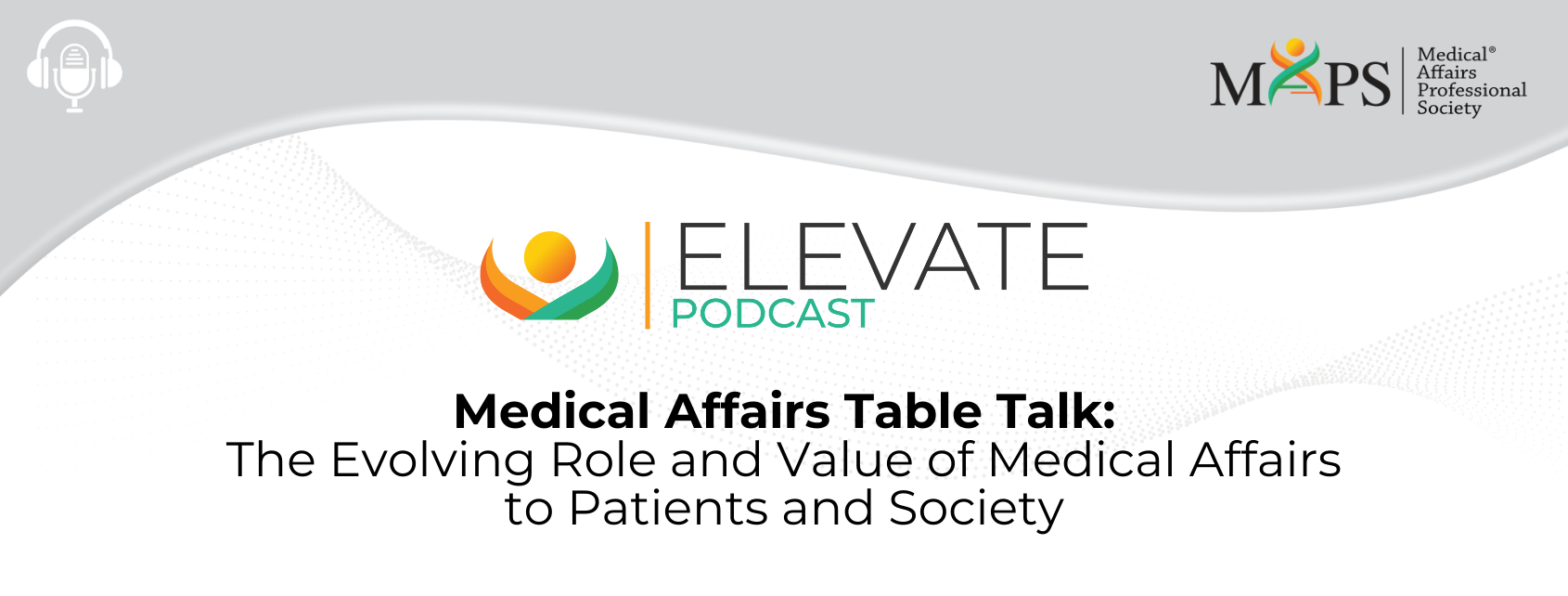How Medical Affairs Benefits Patients and Society

Speaker: Monica de Abadal
As Medical Affairs professionals, it’s easy to focus on the tasks that are right in front of us everyday. In this interview with Monica de Abadal, SVP and Head of Medical Affairs, North America we sat down at the MAPS 2022 Global Annual Meeting to take a step back. Here is how Medical Affairs benefits patients and society. Watch the full interview here.
Following is an automated transcription provided by otter.ai. Please excuse inaccuracies.
Garth Sundem: 00:00:03:23
Hi, everyone. I’m Garth Sundem, Communications Director at MAPS. And today we are recording at the MAPS 2022 global annual meeting in New Orleans with Monica de Abadal, SVP and Head of Medical Affairs, North America with Ipsen. Monica, your bio lists so much experience. I was looking through this before today’s interview and it lists medical strategies, scientific publications, Medical Communications, Medical Information, clinical operations, medical field excellence, medical governance and more. And so instead of trying to pick one of those, I thought maybe we could step back from all of those and talk about Medical Affairs in general. From the highest level possible. What is the role of Medical Affairs and what is the benefit of Medical Affairs? To patients and society?
Monica de Abadal: 00:01:02:00
Well, thank you, Garth, for inviting me today. You are making me feel old.
Garth Sundem: 00:01:06:21
Oh, no. Well, it was only two months, right?
Monica de Abadal: 00:01:11:00
Right. Good. So, yeah, Medical Affairs. You know, most of us in Medical Affairs and many of us are physicians and the first reason why we want to become a physician was to help patients. And you can help patients in many, many ways. So you can be a physician and treat patients with patient by patients directly. But you can also have a role in Medical Affairs, in healthy patients and society. And so for example, of many things that we do in Medical Affairs, is first to try to understand what patients go through in what we call the patient and willingness time, job, what we go through, what big gaps in the healthcare system are, and what are the data that is missing. So, you know, so we kind of really look at generating data evidence that will help new treatments through or we help ensure that we get more and more experience that we the treatments that we have. And we have to really work with patients to understand their point of view as well.
Garth Sundem: 00:02:20:00
So, someone with a disease or a condition and Medical Affairs starts by understanding what the patient journey, what you mean by that, the experience of the person with the condition?
Monica de Abadal: 00:02:29:00
Yes. The experience that that patient goes through from coming the first symptoms and has a diagnoses from diagnosis to pre-treatment and treatment. And it’s not only the experience for that disease only as a whole person experiencing it. So the person they are, their families and their carers so it can be a very tough experience depending on what disease they’re. Where do you live there will be differences from country to country as well as health systems and different.
Garth Sundem: 00:03:08:00
Okay. So if so, Medical Affairs works with the patient to understand the patient journey, I guess not just the patient but the entire ecosystem. So then what do you do with it once you understand the patient journey? What does Medical Affairs do from there?
Monica de Abadal: 00:03:20:00
So one, one part that we do is to really educate and on what’s in that disease state, to healthcare professionals, to patients and to failures, and to really understand what’s going on, and what’s missing. And when you are trying to build that impression that everything’s there, I trying to understand and I would work with all of these stakeholders just to find the what will come next, what has to come next to really fill in the gaps that we have identified.
Garth Sundem: 00:03:56:41
Oh, I gotcha. Okay. So you have the patient journey, but there is there is a holes of not misunderstanding, but there’s lack of understanding in some places in the patient journey and comes down to.
Monica de Abadal: 00:04:11:00
We don’t know everything. So we have gaps and some gaps that are sometimes assumed as normal gaps and sometimes we go through orientation that there is a portion of the population that is not cared for and why in many instances we just assumed that that was normal. Is not necessarily normal. You know, something has to be done about that, for example.
Garth Sundem: 00:04:34:00
Okay. So once we have filled in the patient journey. Well, let me take a step back. So how do how does Medical Affairs fill these gaps? So if you identify a knowledge gap, what does Medical Affairs do about it?.
Monica de Abadal: 00:04:49:00
So, you know, Medical Affairs first can do many things. Sometimes it’s just generating that information to do education around it and sometimes identifying what project that the generation or clinical setting needs to be done, not necessarily by Medical Affairs. It could be done by our clinical development colleagues, for example. It could be done by your HEOR. colleagues or to try that, but bring those insights back is very, very important to understand one of the gaps we’ve seen and then we discuss how to achieve filling that gap.
Garth Sundem: 00:05:29:00
Okay. And at that point it’s so interesting that it’s so cyclical where you’re going out with the purpose of education to health care professionals and you’re providing this education, but then you’re realizing the education you don’t have So you go back in-house and this is another part of the cycle. You generate that evidence and then you go back out and communicate it again and you find out what else you don’t know.
Monica de Abadal: 00:05:54:00
Exactly. So it becomes always a circle because we will always be learning new things.
Garth Sundem: 00:05:59:00
Yes. Okay. And so then again, so you start by understanding this patient journey and you find the gaps, you fill the gaps, you communicate the gaps. How does that at the very end of this, I don’t know if you’d call it a value chain, but maybe value chain. How does that benefit patients?
Monica de Abadal: 00:06:14:24
Well, in the end, you know, after filling all of those gaps and building more and more data to perhaps bring new treatments to patients, to bring new ways of working to, you know, perhaps that resourcing health care system changes. And depending on what that is, patients will benefit from having more treatment options for more ways of accessing health care or for having maybe deeper treatment options that are given in a different fashion that’s more comfortable to patients, so patients can benefit in many, many ways. And not only patients, patients, carers, families that are going to to help them find that patients and their lives are much impacted by, you know, improving patients lives and improving family’s life as well.
Garth Sundem: 00:07:12:07
That’s a very humanistic perspective. So stepping not back, but stepping maybe towards collected patients. How does Medical Affairs benefit society then? And I’m thinking things like access and equity or use or how what is the role of Medical Affairs in society?
Monica de Abadal: 00:07:34:00
Yes, certainly as physicians, we want to make what we want more to help patients know what the origin of the country of the patient, of course, is. Knowing, though, that, you know, things work very, very different from country to country, even within country for a reason to reach. So there are differences there. So our role, even needs it. We try to get that access and equity as much as we can. So sometimes there are ways and we can give or at least have a role in equity, either having conversations with payers, policymakers, but also in developing access programs that make sure that patients that have less you know, less potential for access to also get access in another fashion.
Garth Sundem: 00:08:27:39
All right. Well, this has been a fascinating conversation about what Medical Affairs does. And now we should both go back to the meeting and figure out how Medical Affairs does it. So thank you all for joining us today. Thank you, Monica. Thank you. And we hope to see you all at Future MAPS Events.
MAPS: 00:08:47:500
For more information on how you can participate in the MAPS 2022 EMEA Annual Meeting, the largest annual gathering of Medical Affairs professionals in the region, visit Paris2022.MedicalAffairs.org and Join The Movement.



